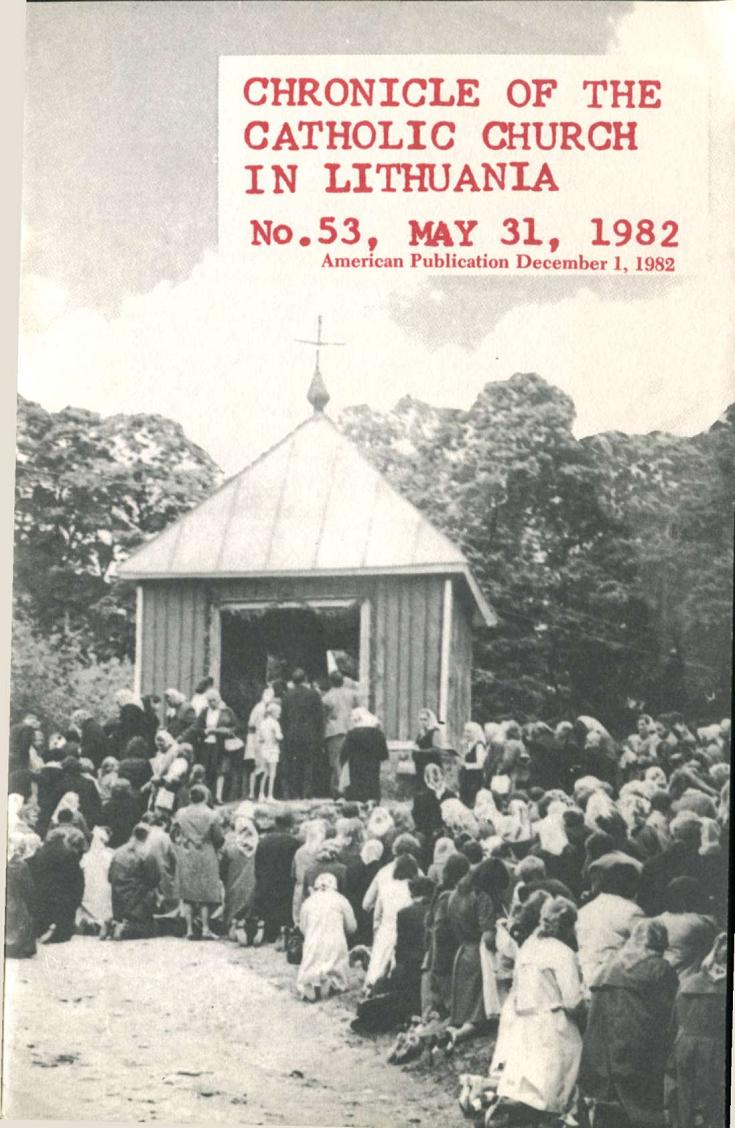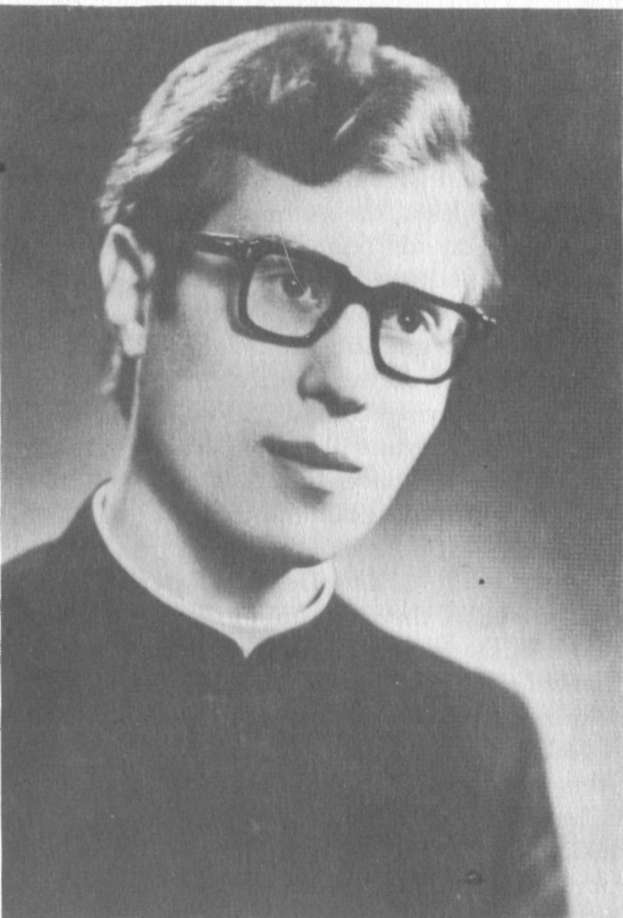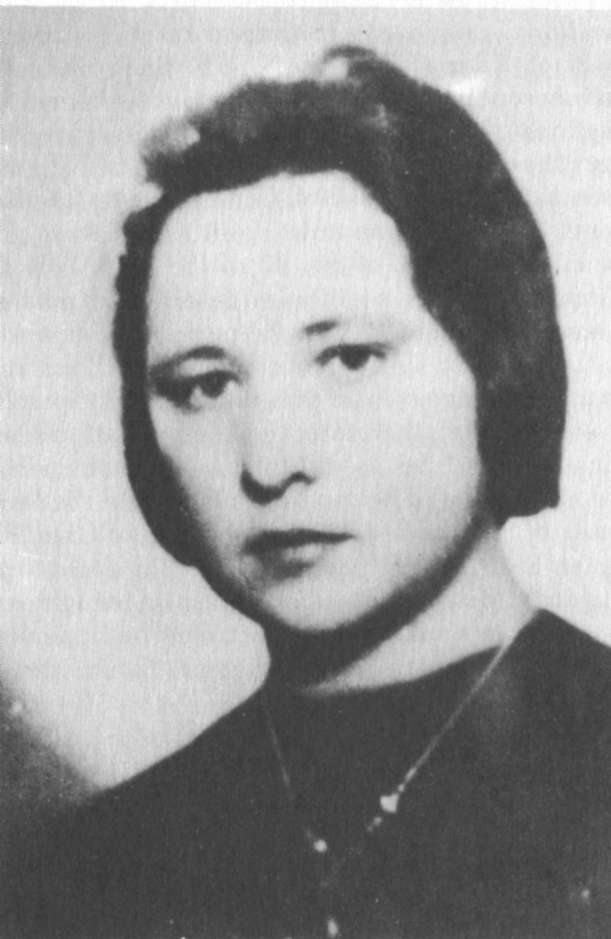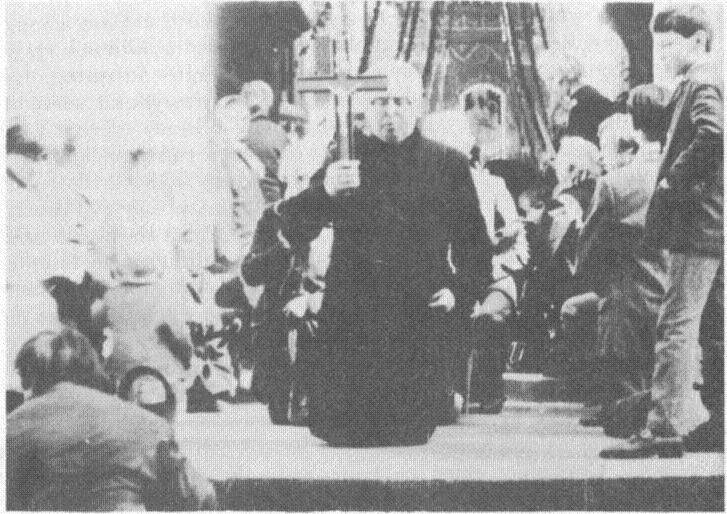
CHRONICLE OF HE CATHOLIC CHURCH IN LITHUANIA No. 53 
In this Issue:
4. The Council for Religious Affairs "Brain-Washes"
5. A Victim of Soviet "Freedom of Conscience"
7. Searches and Interrogations
9. The Priests and Faithful of Lithuania Write
10. The Catholic C a l e n d a r - D i r e c t o r y
Lithuania May 31, 1982
On March 19, 1982, the Chronicle of the Catholic Church in Lithuania celebrated its 10th anniversary. On the occasion, many friends of the Chronicle prayed and congratulated the Chronicle of the Catholic Church in Lithuania, both in Lithuania and in the West. Many messages reached the editors of the Chronicle via Vatican Radio, Radio Liberty and Voice of America broadcasts.
Our thanks for the solidarity,
for the kind words,
for the Christian love!
Our thanks to:The editors of Lithuanian broadcasts at Vatican Radio,
Radio Liberty and Voice of America;
Director Jonas Jurašas and emigrant Lithuanian youth for preparing the radio broadcasts;
The International V. Petkus and N. Sadūnaitė Committee;
Fatima Campaign 77;
The Christian Solidarity International
Committee and all, all of Lithuania's friends for their messages and prayers.
Our thanks for not abandoning us to fight alone for God and the homeland!
During the night of April 2 to 3, 1982, Maiden Hill, located within the boundaries of the Žemaičių Kalvarija Parish, was devastated: the chapel and two shrines were demolished, even their foundations were razed, concrete monuments and all crosses were overturned, the fence was removed . . . That same night, crosses were uprooted near the Varniai-Telšiai Highway, in the Villages of Kungiai and Jomantai as well as in the Village of Anulėnai near the Palanga-Šiauliai Highway. (This beautiful Eigirdžiai Parish cross had been cherished from of old and decorated by the faithful. People used to go there to make vows.)
The faithful were highly incensed, and their complaints flooded the Council of Ministers of the Lithuanian SSR, the Central Committee of the Communist Party of Lithuania, the Ministry of Culture, the editors of the atheist television program Argumentai (Arguments), the Catholic Committee for the Defense of Believers' Rights and the Military Prosecutor of the USSR.. Several delegations of the faithful appealed to various rayon agencies. Learning about the desecration of the Hill, the faithful began a vigorous campaign of atonement: they are having Mass offered, receiving the sacraments, going to Maiden Hill by car or on foot: at times in a virtually unbroken stream. For example, forty passenger cars were counted at 3:00 P.M. on May 2nd.
The crosses and statuettes retrieved from the water have been tied with black ribbons and returned to their places; crosses made of sticks and stones dot the hill itself as well as the woods and the roadside. A new cross has been erected along the road to Maiden Hill. New crosses have sprouted up in the Villages of Anulėnai and Vembutai. On April 24, 1982, a new cross to the Samogitian martyrs was erected in Rainiai, the godless destroyed it on April 26th.
On June 6, 1982, the Apostolic Administrator of the Archdiocese of Kaunas and the Diocese of Vilkaviškis, Bishop Liudvikas Povilonis, ordained the following deacons to the priesthood at the Kaunas Cathedral:
Albinas Arnašius Vytautas Brilius Zenonas Degutis Stasys Čiupala Anton Filipčik Juozas Gražulis
Kazimir Gvazdovič Edmundas Kulvietis
Kazys Meilius Leonid Nestiuk Juozas Norkūnas Aloyzas Orantas
Alfonsas Petraitis Rokas Puzonas Žygintas Vaselka Kęstutis Vilutis
That same day, the Apostolic Administrator of the Diocese of Panevėžys, Bishop Romualdas Krikščiūnas, administered Holy Orders to Deacons Albinas Paltanavičius and Raimundas Saprigonis.
Not since 1963 has the Kaunas Theological Seminary graduated this many priests in one year.
Parish Committees
From March to April 1982, employees of the Council for Religious Affairs conducted "seminars" throughout Lithuania for parish committees — committees of twenty — which were also attended by members of atheist support groups. Priests were strictly forbidden to attend.
Such a "seminar" was held in Vilkaviškis on March 24, 1982.
The Vice Chairman of the Rayon Executive Committee stated that "unsuitable" sermons are preached at the Pajevonis, Kybartai and Didvyžiai Parishes. It happens that the priests are making pastoral visits, for example, in Vilkaviškis. At the Kybartai Parish, the pastor himself is the chairman of the parish committee. Not all parishes ask rayon permission to invite priests when assistance is needed. Kybartai has an impostor priest who did not study anywhere,

Aloyzas Volskis, expelled from the Kaunas Theological Seminary as a fourth-year student for associating with "extremist" priests. He is presently working with the liturgical commission in Lithuania
has not been ordained and does not have a government permit (Father Jonas Matulionis — Ed. Note).
Telšiai
On April 12, 1982, the Education Department of the Rayon of Telšiai dismissed (Miss) Stefanija Juozumaitė, a German teacher and also llth-grade homeroom teacher at the Žarėnai Middle School, for her religious convictions. For two years now Teacher Stefanija Juozumaitė has publicly attended church almost daily. For an entire year the teacher was persecuted by school Principal (Mrs.) Jankauskienė, the party organization and chekist Norkūnas. At the beginning of April, a representative from the Ministry of Education also threatened her with dismissal. Chekist Norkūnas continually intimidated the teacher and suggested she resign: if she agrees to collaborate with the security police, she can continue to teach and attend church, moreover, he suggested that she report regularly on Father Jonas Kauneckas' sermons.
On April 12th (Easter Monday), the teacher was dismissed without being given two-weeks notice as the law requires. Principal (Mrs.) Jankauskienė stated: "You're still hung over from Easter and are fired as of today, tomorrow you can pick up your work papers and your pay at the education department." She did not even allow the teacher to return written assignments to her students. "Someone will do it without you! " explained the principal.
The work papers carried the notation: "For not fulfilling all the obligations of Communist upbringing." That is an absolute lie, for Teacher (Miss) Juozumaitė trained the 11th grade well; there were no complaints against her. She simply did not teach atheism which was contrary to her convictions.
Since under Soviet law even a citizen who has violated work discipline cannot be dismissed without a written notice and other means of social persuasion (criticism in the press, at meetings, etc. is not considered a means of social persuasion, see Moreinas, Darbo ginčų nagrinėjimas (Investigation of Work Disputes), p. 93, (Miss) Juozumaitė appealed to the Telšiai People's Court to reinstate her as unjustly dismissed.
After honorably serving her sentence, (Miss) Genovaitė Navickaitė returned from the Panevėžys Labor Camp on April 17, 1982. On October 24 and 25, 1980, (Miss) Navickaitė had been sentenced to two years' loss of freedom to be served in a general regime labor camp and was taken to the Panevėžys Women's Prison where her "re-education" was soon undertaken.
At the end of April 1980, when the security division inspector returned to (Miss) Navickaitė several letters in which she wrote that not all her letters reach their addressees and that the prison administration refused to grant her any private visits, she began to explain to the prisoner the unwritten rules of correspondence a prisoner must follow: What can and cannot be written, strictly forbade her to number the letters she sends and warned that if the prisoner refused to follow these directions, she would be punished. That same inspector urged (Miss) Navickaitė to associate

Genovaitė Navickaitė
more with criminal prisoners and shun (Miss) Ona Vitkauskaite, convicted of duplicating the Chronicle of the Catholic Church in Lithuania and imprisoned in the same labor camp.
Alytus
On May 6, 1982, a militia official detained Father Kazimieroj Mindaugas Žilys near the church and stated that they wished to inspect his room (at Panemunykėlių 5 in Alytus), because citizen Voveris, who was allegedly printing catechisms ordered by Father Žilys, had been detained in Kaunas. During the search, a large number of Lithuanian and Polish catechism pages were confiscated. After the search, Father Žilys was interrogated several times. He was brought into a face-to-face confrontation with Voveris. The latter recognized the priest. The interrogator attempted to obtain the necessary testimony from Father Žilys, but he refused to talk. Upon releasing Father Žilys to go home, the interrogator placed him under house arrest.
Kaunas
At the beginning of May 1982, a group of militiamen arrived at the seminary and searched the room of third-year seminarian Petras Linkevičius. No incriminating items were found. It appears that the search was conducted in an attempt to find individuals who produce religious publications: catechisms and prayerbooks.
From a letter of Vytautas Skuodis written at the beginning of February 1982:
"... It will soon be one year that I'm here (Skuodis has been interned in the labor camp since February 9, 1981 — Ed. Note). I didn't even watch the holiday broadcasts on television, not because I'm set against them, but because there is never 'enough time'. I'm a very avid reader. Moreover, I've always yearned to be with my thoughts, attempting to put every minute to good use, and I've long since wearied of that passive information and am disinterested in the type of culture that distracts and afterwards leaves a kind of spiritual vacuum behind.
"No need to wish the time to pass more quickly. As is, it passes too rapidly. If life is meaningful and rich, it must be lived as deeply as possible at least in one's soul.
". . .While here, I read somewhere that beauty, virtue and truth in the world is produced by the Eternal Truth whom believers call God.
"I am truly happy.
"I sincerely thank everyone who writes to me. My heartfelt thanks to everyone, everyone, everyone for their greetings and wishes. Please convey my best wishes to all who remember me. May God's blessing attend you all and may He fill all your hearts with His divine graces."
Viduklė
To: The People's Court of the Rayon of Raseiniai A Complaint from: Citizen Svarinskas, Alfonsas, son of Vaclovas, res. in Viduklė, at Šaltinio g. No. 1.
On March 20th of this year, I received a ruling dated March 16, 1982, from the Administrative Commission of the Rayon of Raseiniai Council of People's Deputies Executive Committee, stating:
"At 9:00 P.M. on February 20, 1982, the Pastor of the Viduklė religious community held a children's meeting in the rectory attended by some 30 children. About fifteen parents also attended this meeting. The students performed a play at the meeting. Those who participated in the play wore makeup and costumes depicting the characters. They thereby violated the May 12, 1966 Decree of the

Father Alfonsas Svarinskas, Pastor of the Viduklė Church, leading services of atonement for the desecration of the Blessed Sacrament there in 1981. (See Chronicle of the Catholic Church in Lithuania, No. 49)
Supreme Soviet Presidium of the Lithuanian SSR: 'Regarding administrative responsibility for violating the laws on religious cults.' Impose on citizen Svarinskas, Alfonsas, V. a 50-ruble administrative fine."
With this year four months gone, the priests of Lithuania received a liturgical calendar, called a Catholic Calendar-Directory. In fact, Catholics did not receive this Catholic Calendar. Churches and priests received one copy each.
The Catholic Calendar did not gratify priests, for its purpose was clearly propaganda. Moreover, we find in the Calendar not only omissions of the truth, but blatant lies and pure propaganda maneuvers as well.
The Calendar (p. 72) omits mentioning the Apostolic Administrator of the Diocese of Kaišiadorys (exiled Bishop Vincentas Sladkevičius), (Reinstated in July, 1982. See Chronicle of the Catholic Church in Lithuania, No. 54 — Trans. Note) and only names the diocese's Capitular Vicar; p. Ill likewise omits the Apostolic Administrator of the Archdiocese of Vilnius, Bishop Julijonas Steponavičius.
For some reason, the Catholic Calendar did not include in the Conference of Lithuanian Bishops the exiled bishops. Being the legal administrators of their dioceses, do they not have the right to belong to the Conference of Lithuanian Bishops?
Kaunas
In May, 1982, a conference on peace was held in Moscow foi representatives of the world's religions. The Religious Affairs Com missar sent Bishop Liudvikas Povilonis, Vicar General Msgr Liudvikas Mazonavicius and Dr. Viktoras Butkus, rector of the seminary, to this conference. Lithuania's believers and priests disap prove of the clergy attending such conferences because Moscow organized "conferences for the defense of peace" are a shan. beginning to end. Clergy, forced to attend should at least not speal n behalf of the laithful and priests, but only in their own name.
Those who attend Soviet meetings "for the defense of peace" should remember the words of Pope John Paul II:"To have peace, it is essential to respect human freedoms and rights!" Believing people would be indebted to their shepherds, if at conferences "for the defense of peace", they would publicize the lack of rights and the wrongs experienced by the Catholic Church in Lithuania.
When German bishops came to Lithuania in 1981, they stated: "None of us attend the Berlin peace conference, while you serve propaganda which proclaims freedom while oppressing you."
Leipalingis
To: First Secretary Petras Griškevičius of the Central Committee of the Communist Party of the Lithuanian SSR.
A Statement from: Grigas, Antanas, son of Antanas, res. in the Rayon of Lazdijai, in Leipalingis, at Naujoji g. 13.
In 1978, my son Robertas Grigas did very well on all entrance exams and was accepted as a German major of the languages at the Vilnius State Pedagogical Institute. He passed the first and second year final exams also with honors, and as a result, was awarded a higher scholarship and a top-student pin. However Robertas was not only a gifted and good student but, as described to us by curator Head Instructor (Mrs.) Mikalauskienė and other instructors, did not smoke, totally refrained from alcohol and swearing. And, what was "very bad", he was a young man who did his own thinking. It appears that such students are considered undesirable at our schools of higher learning. Very obvious efforts were manifested to get rid of him.
On November 28 and December 27, 1979, Robertas was "educated" at the dean's office by Vilnius KGB 1st Lieut. Antanas Bimbyris. He spoke about forgetting the lessons of the past, the dangers inherent in friendship with "nationalists"; he feared that the latter are leaving behind them "bad offshoots" among the youth. The chekist demanded that the content of both "education sessions" be kept secret, offered his telephone number and invited him to meet in town for "friendly talks". My son categorically refused to hide from the students the fact that the dean's office is used as a branch of the KGB and rejected the security agent's offers. When, as was traditional, third-year German language students went to the German Democratic Republic for one month in the fall of 1980, Robertas was openly discriminated against, and forbidden to accompany the group on the pretext that he had not yet joined the Communist Youth League.
Lietuvos ateitis (Lithuania's Future), No. 1. This is a new underground publication especially aimed at believing youth. The first issue of Lithuania's Future which drew considerable attention, appeared in January, 1982. "Many critical comments, good suggestions have been received . . . This clearly indicates that it is not only useful, but also necessary for youth to have a publication in which they can freely express their ideas and beliefs and discuss current problems." (Lithuania's Future, No. 2)
Lithuania's Future, No. 2 devotes considerable space to the second anniversary of the death of Father Virgilijus Jaugelis: it provides more extensive information on Father Jaugelis and prints statements from young people who know him closely.
The publication examines current problems and debates '"How Should Believing Youth Be Today?" (offers concrete ways and means whereby every believing young person can serve God and homeland in his daily life).
We wish Lithuania's Future a long life in illuminating and pointing the road to the future for Lithuania's youth!





